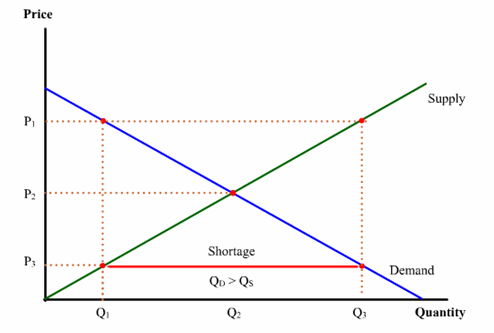Excess Demand Blues - Scalpers profit from ticket shortage
Excess demand generated by low concert ticket price created profitable opportunity for scalpers.
Last summer I saw that my girlfriend’s favorite musician Norah Jones was going to be performing at the Orpheum here in Memphis. I thought she would be excited if I could get tickets for us to go to the show. Apparently I didn’t realize how popular this performer was and her concert sold out on the first day before I could buy any tickets. All the tickets were initially sold for $45 apiece, despite the seating section. I was disappointed but I just forgot about it. Later I browsed on eBay.com to see if there was anyone selling them there. It turned out that there were over a dozen people selling the concert tickets there. The prices were outrageous (some around $400 or $500), so I tried to negotiate for a price I could afford, but was not successful.
Normally I would have given up, but I knew that my girlfriend would really want to go to the concert. I decided to wait and see if there would be any scalpers selling tickets on the day of the concert. I went down to the Orpheum with my brother on the morning of the show and found a lot of people with tickets for sale. I ended up purchasing a pair for double the initial price from a person who had a bundle of tickets he was trying to sell. They cost more than they did originally, but less than those on eBay.com. I surprised my girlfriend with them and we went to the concert, and everyone was happy.
Excess demand occurred because all the tickets were priced at $45 apiece. There were many people willing to pay $100 and more per ticket. I saw some pay five times the original price of $45 on eBay. Because the original price at $45 was too low, the quantity demanded exceeded the quantity supplied and a shortage was created. To clear the market, the theatre should have sold the scarce number of tickets at a higher price. At least they should have sold tickets at various prices according to preferred seating sections to move closer toward market clearing. Selling the tickets at too low of a price allowed many people to see the show for $45 while people who wouldn't mind paying more just had to miss out. After the entire quantity of tickets supplied was sold at $45 apiece, quantity demanded still remained at various price levels which were above the initial $45 level. Scalpers, by raising the price to market-clearing levels, raked in profits that could have gone to the original ticket sellers.
Notes:
- Joseph Clara is an undergraduate economics major at the University of Memphis.
Glossary:
- excess demandThe excess of quantity demanded over quantity supplied at a given price. Also known as shortage.

- shortageThe excess of quantity demanded over quantity supplied at a given price. Also known as excess demand.

Topics:
Keywords
black market, concert, excess demand, market clearing, scalper, scalping, shortage, ticket price
